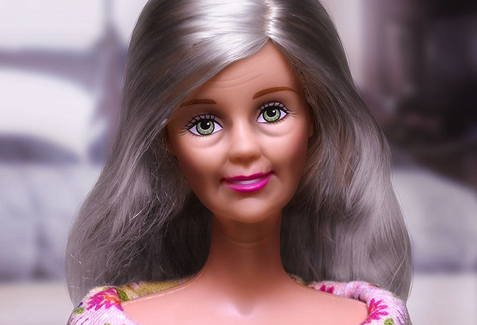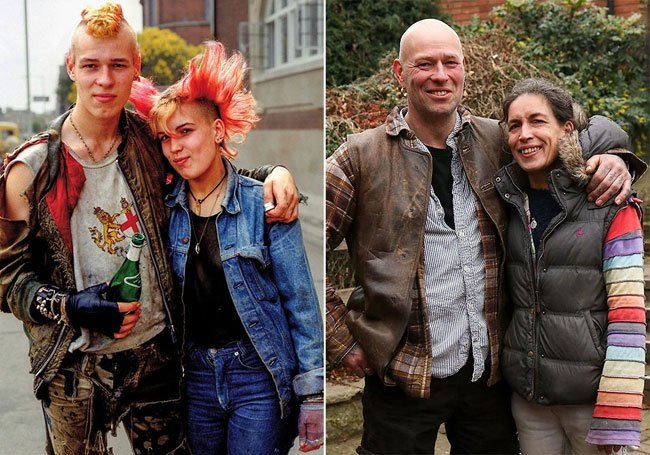
From a Buddhist point of view, we don’t want to slow aging. We would like to live a long life, so we can be of benefit and enjoy it thoroughly. But we don’t want to stay young. That’s some kind of weird attachment to external looks, perhaps. Of course, it is beautiful to stay fit, active, drive less, walk more, take the stairs, walk on the escalator!
But instead of trying to stay “young,” let’s practice the four reminders.
Aging. We feel anxiety around it. We fight it. It wins, every time. So how do we age gracefully, healthfully? The Buddha had advice on that, below.
The Buddha: on aging gracefully.
“At death, a person abandons what he construes as mine.” ~ The Buddha.
~
On one occasion, late in his life, the Buddha sat warming his back in the western sun. Then Ananda [a senior student] went to the him and massaged his limbs with his hand and said,
“It is amazing, lord. It is astounding, how the Blessed One’s complexion is no longer so clear and bright; his limbs are flabby and wrinkled; his back, bent forward; there’s a discernible change in his faculties—the faculty of the eye, the faculty of the ear, the faculty of the nose, the faculty of the tongue, the faculty of the body.”
“That is the way it is, Ananda. When young, one is subject to aging; when healthy, subject to illness; when alive, subject to death..”
With the arising of birth there is the arising of aging and death.
~
The householder Nakulapita went to the Blessed One and said,
“Bhagavan, I am a feeble old man, aged, advanced in years, having come to the last stage of life. I am afflicted in body and ailing with every moment. And it is only rarely that I get to see the Bhagavan and the monks who nourish the heart. May the Bhagavan teach me, may the Bhagavan instruct me, for my long-term benefit and happiness.”
“So it is, householder. The body is afflicted, weak, and encumbered. So you should train yourself: ‘Even though I may be afflicted in body, my mind will be unafflicted.’ That is how you should train yourself.”
Sariputta added: “And how is one afflicted in body but unafflicted in mind? A well-instructed disciple has regard for noble ones and is well-versed and disciplined in their Dharma [truth]; has regard for men of integrity and is well-versed and disciplined in their Dharma [truth]—his form changes and alters, but he does not fall into sorrow, lamentation, pain, distress, or despair over its change and alteration.”
~
On one occasion, two men went to Buddha and said:
“Master Gotama, we are brahmans—feeble old men, aged, advanced in years, having come to the last stage of life, 120 years old. Teach us, Master Gautama. Instruct us, Master Gautama, for our long-term benefit and happiness.”
The Buddha replied:
“This world is swept away by aging, by illness, by death.
For one swept on by aging, no shelters exist.
Keeping sight of this danger in death,
do meritorious deeds that bring bliss.
Make merit while alive.
When the world is on fire with aging and death, one should salvage [future wealth] by giving.”
~
“What, if well-established, serves one well until old age?
What is a precious treasure for man?
What is difficult for thieves to take away?”
Buddha’s answer:
“Moral conduct serves one well till old age.
Sradda [1] if well-established, serves one well.
Knowledge is a precious treasure for man.
The merit of good actions is difficult for thieves to take away.”
– Jara Sutta
[1] Sradda (Sanskrit) or saddha (Pali), is confidence resting on inner knowledge. What is meant is hardly blind faith, but deep conviction and even better: confidence based on one’s activated knowledge. It is established by experience alone.
~
Wellness Bonus:
How to Age Gracefully (youtube.com)
Make friends with yourself:
Below, I think she looks great: “Regardless of whether you think she looks good or not what’s the point of posting something like this? What does it give people to be mean for no reason? I’ll never understand it.”

Why is it folks feel a need to comment on someone’s body?
God forbid someone ages. God forbid a parent doesn’t look the same as when they were a teenager?
What matters most is how we feel. Folks with caring in their hearts, sincerity, joy, emotional intelligence, and self-friendship are truly beautiful.
Social media is designed by greedy men, too often, to maximize profits, comments/arguments, and outrage, not bring out our better angels/basic goodness. Full disclosure: my body isn’t perfect, and I love myself and others!
~

Shame on LoLo, whoever she is. It’s called aging gracefully. https://www.elephantjournal.com/2010/06/every-body-gets-old/ Good for Pam Anderson. She’s about to turn 58. It has been 30 years since Baywatch. Did they really expect her to look the same? It’s sad that people expect women to retain ridiculous beauty standards, even as they get old. Those who try just start looking…off.
~
Actresses At The Beginning Of Their Career vs Now (imgur.com). Don’t think Aniston was in Bueller.
Meryl Streep wearing the same dress 30 years apart: 
What a difference 40 years make:

 Share on bsky
Share on bsky

Read 26 comments and reply